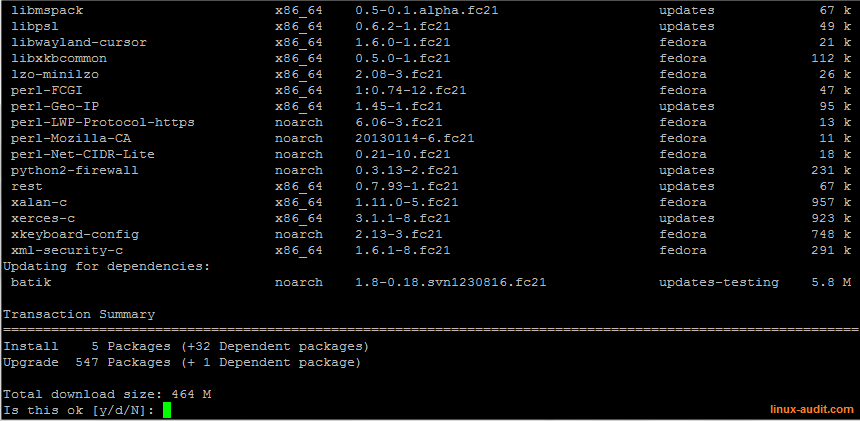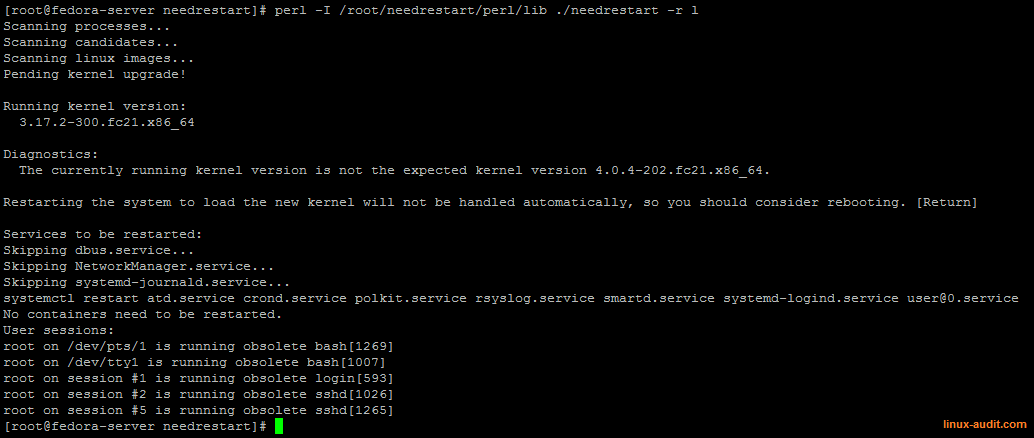Determine which processes need a restart with checkrestart/needrestart
This article has last been updated at .
Proper software patch management helps reducing weaknesses on your systems. But even if you patched an outdated system, old processes and libraries can continue to run in memory. For example when a library is updated, an active program might still use the old version. To really finish the process of software patching, we have to do more. This includes preparation, performing the update and finally check if we need a restart of software components. In this post we have a look at several options, to properly execute this last part of the process. An introduction into the world of tools like checkrestart and needrestart.
Checkrestart
The first utility to help with the job of finding processes using old files, is checkrestart. It is part of the debian-goodies package and only available for Debian based systems. It uses lsof to determine open files and what processes using such resource.
Installation
apt install debian-goodies
Requirements
- Debian (or clone)
- Python
- LSOF
- root permissions
Usage
Running the checkrestart command will give an overview of what it discovered and what processes need a restart. It shows the processes using old files and determines what init scripts are related to these processes. Of course, those which it can find. For the others it will display the related processes, so you can manually take action.
Example output
# checkrestart
lsof: WARNING: can't stat() fuse.gvfsd-fuse file system /run/user/1000/gvfs
Output information may be incomplete.
Found 68 processes using old versions of upgraded files
(48 distinct programs)
(40 distinct packages)
Of these, 7 seem to contain init scripts which can be used to restart them:
The following packages seem to have init scripts that could be used
to restart them:
sudo:
3908 /usr/bin/sudo
cups-browsed:
1457 /usr/sbin/cups-browsed
samba:
965 /usr/sbin/smbd
700 /usr/sbin/smbd
2371 /usr/sbin/nmbd
mdm:
1491 /usr/sbin/mdm
pulseaudio:
3039 /usr/bin/pulseaudio
cups-daemon:
3568 /usr/sbin/cupsd
dbus:
2822 /bin/dbus-daemon
3477 /bin/dbus-daemon
2385 /bin/dbus-daemon
2836 /bin/dbus-daemon
507 /bin/dbus-daemon
These are the init scripts:
service sudo restart
service cups-browsed restart
service samba-ad-dc restart
service smbd restart
service samba restart
service nmbd restart
service mdm restart
service pulseaudio restart
service cups restart
service dbus restart
These processes do not seem to have an associated init script to restart them:
udisks2:
3162 /usr/lib/udisks2/udisksd
policykit-1:
918 /usr/lib/policykit-1/polkitd
modemmanager:
783 /usr/sbin/ModemManager
blueman:
3255 /usr/bin/blueman-applet
network-manager:
912 /usr/sbin/NetworkManager
mate-polkit:amd64:
3257 /usr/lib/x86_64-linux-gnu/polkit-mate-authentication-agent-1
xserver-xorg-core:
1498 /usr/bin/Xorg
gvfs-daemons:
3143 /usr/lib/gvfs/gvfs-udisks2-volume-monitor
3554 /usr/lib/gvfs/gvfsd-metadata
3321 /usr/lib/gvfs/gvfsd-trash
mate-keyring:
2996 /usr/bin/mate-keyring-daemon
caja:
3236 /usr/bin/caja
system-tools-backends:
3487 /usr/sbin/system-tools-backends
gvfs-backends:
3214 /usr/lib/gvfs/gvfs-mtp-volume-monitor
3203 /usr/lib/gvfs/gvfs-afc-volume-monitor
3208 /usr/lib/gvfs/gvfs-gphoto2-volume-monitor
marco:
3015 /usr/bin/marco
upower:
3272 /usr/lib/upower/upowerd
mintupdate:
3821 /usr/lib/linuxmint/mintUpdate/mintUpdate.py
mate-screensaver:
3258 /usr/bin/mate-screensaver
at-spi2-core:
3472 /usr/lib/at-spi2-core/at-spi-bus-launcher
dnsmasq-base:
2142 /usr/sbin/dnsmasq
3543 /usr/sbin/dnsmasq
mate-bluetooth:
3261 /usr/bin/mate-bluetooth-applet
consolekit:
2476 /usr/sbin/console-kit-daemon
gvfs-fuse:
3023 /usr/lib/gvfs/gvfsd-fuse
google-chrome-stable:
3646 /opt/google/chrome/chrome
3859 /opt/google/chrome/chrome
3642 /opt/google/chrome/chrome
3683 /opt/google/chrome/chrome
3675 /opt/google/chrome/chrome
3666 /opt/google/chrome/chrome
3612 /opt/google/chrome/chrome
3691 /opt/google/chrome/chrome
5706 /opt/google/chrome/chrome
3694 /opt/google/chrome/chrome
3601 /opt/google/chrome/chrome
3698 /opt/google/chrome/chrome
3621 /opt/google/chrome/chrome
3708 /opt/google/chrome/chrome
3616 /opt/google/chrome/nacl_helper
mate-terminal:
3891 /usr/bin/mate-terminal
mate-settings-daemon-pulse:
2987 /usr/bin/mate-settings-daemon
system-config-printer-gnome:
3252 /usr/share/system-config-printer/applet.py
mate-session-manager:
2547 /usr/bin/mate-session
isc-dhcp-client:
2024 /sbin/dhclient
mintmenu:
3049 /usr/lib/linuxmint/mintMenu/mintMenu.py
mate-media-pulse:
3259 /usr/bin/mate-volume-control-applet
network-manager-gnome:
3248 /usr/bin/nm-applet
3263 /usr/bin/nm-applet
mate-panel:
3055 /usr/lib/mate-panel/clock-applet
3032 /usr/bin/mate-panel
3051 /usr/lib/mate-panel/wnck-applet
login:
3909 /bin/su
mate-power-manager:
3244 /usr/bin/mate-power-manager
From this output we can see what processes can be restarted, along the related init script. Additionally it shows what processes need also restarting, but lack the related script.
Checkrestart status
The utility does what it should do. However, it is limited to Debian based systems and the code contains a lot of “to do” items. If you are evaluating software components in this article, you definitely want to read more about Needrestart.
Needrestart
Another utility is needrestart. Like checkrestart it determines what processes need a restart, after running a software upgrade. It is part of the package with the same name and written in Perl. It seems to be well-maintained and supports newer technologies like containers (LXC, Docker). The tool hooks into the update process, so for example it can restart services after running a “dpkg upgrade”. It is also possible to run it manually, with specifically the mode to list processes only, provide the option to do restarting (interactively) per process, or do them all automatically.
Support for package managers
Needrestart supports a few package managers out of the box:
- DPKG
- Pacman
- RPM
Needrestart restart uses features of the package manager to determine which related package, or daemon needs a restart. It does so by looking for the related startup script. In the case of systems using DPKG, it actually uses some intelligence from the previously mentioned checkrestart utility. For RPM it leverages the rpmquery utility, for pacman the pacman utility itself.

Running security updates, before needrestart comes into play
Installation
Debian / Ubuntu
apt install needrestart
Fedora
For our Fedora system we used the following steps to get the tool working. Instead of using Git, you might use a custom package to simplify the handling of dependencies. As we simply use it for testing on our Fedora 21 test server, we install the dependencies and run it from the root home directory.
# cd /root
# yum -y -d1 install git perl-Module-ScanDeps perl-Proc-ProcessTable perl-Sort-Naturally perl-Term-ProgressBar-Simple perl-Module-Find.noarch perl-ExtUtils-MakeMaker.noarch
# git clone https://github.com/liske/needrestart
# cp /root/needrestart/needrestart.conf /etc/needrestart/needrestart.conf
# mkdir /etc/needrestart/hook.d
# cp /root/needrestart/ex/hooks/* /etc/needrestart/hook.d
# perl -I /root/needrestart/perl/lib ./needrestart -r l</pre>
Configuration of Needrestart
By default, not much configuration is needed for this utility. It works great out of the box. When adjustments are needed for the behavior of the tool, this can be done via the configuration file /etc/needrestart/needrestart.conf . Some of options that are found in the configuration file, can also be adjusted via the command line (e.g. type of operation).
So what is there to configure? The default restarting mode, what processes should be ignored etc. This way you can change the utility to do its job, while avoiding restarting unwanted parts of the system.
Needrestart in action
So after running security updates, we will run needrestart. In this example, we use it on a Fedora system. Just after applying hundreds of software patches, we run the tool in list mode (-r l):
Kernel and software restart needed
Needrestart found several processes which needed a restart. The tool even checks if the latest installed kernel is running and discovered an outdated kernel being active. In this case a full system restart would even be better.
Which one to use?
After reviewing them both, go for the needrestart utility. It works on multiple Linux based systems, is well-maintained, has support for newer technologies and does it job very well. As always, we encourage testing first on non-production systems.
Found even a better tool to handle this job? Let it know!
